A Tibetan monk named Choekyi, 38, was detained and disappeared at around 5. 30 pm on 19 June 2015 in Wal-shul, Serthar (Ch: Seda) County, Kardze (Ch: Ganzi) Tibetan Autonomous Prefecture, Sichuan Province. A day after his detention and subsequent disappearance, Choekyi’s sister Kyinzom and her son, Drakpa, were detained and kept in police custody for 15 days subjected to…
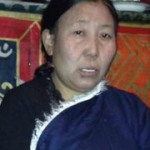
The Tibetan Centre for Human Rights and Democracy (TCHRD) condemns the illegal and incommunicado detention of Tenzin Delek Rinpoche’s relatives and calls for immediate investigation into the death of Rinpoche in Chuangdong Prison near Chengdu, capital of Sichuan Province, People’s Republic of China (PRC).
Information received by TCHRD confirms the arbitrary detention of Rinpoche’s sister Dolkar Lhamo, age 52, and niece Nyima Lhamo, age 25, at an undisclosed location after they submitted a petition calling for an investigation into circumstances leading to Rinpoche’s death. Both women were detained on 17 July from a restaurant in Chengdu by police officers from Lithang County, located in Tibetan province of Kham. They have not been heard or seen since then.
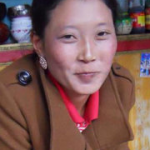
TCHRD believes that both relatives have been detained in connection with their sustained campaign to call for the release of Rinpoche’s remains and for calling on the Chinese authorities to launch an impartial investigation into the death of Rinpoche in prison. The petition has been widely shared and circulated by exile Tibetan organisations and submitted by TCHRD to the UN High Commissioner for Human Rights and relevant Special Procedures division including Special Rapporteur on torture and other cruel, inhuman or degrading treatment or punishment; Special Rapporteur on Freedom of Religion or Belief; Special Rapporteur on the promotion and protection of the right to freedom of opinion and expression; and Special Rapporteur on the rights to freedom of peaceful assembly.
Rinpoche’s relatives did not deserve arbitrary detention and the psychological and physical harm associated with it; they submitted a petition calling for an impartial investigation into the death of Rinpoche. Submitting petitions to challenge the arbitrary use of power by government agencies does not break any law, therefore, the officers who detained them must be made accountable for their unlawful actions.
Tenzin Delek Rinpoche’s death was the result of a series of human rights violations. Even after his death, the government of People’s Republic of China (PRC) still has human rights obligations that it is legally obliged to follow. After ignoring its legal obligations and Tenzin Delek Rinpoche’s rights to be protected from arbitrary detention, torture, cruel, inhuman and degrading treatment, and arbitrary or extrajudicial killings, the PRC should investigate Tenzin Delek Rinpoche’s death and make the results of the investigation public.
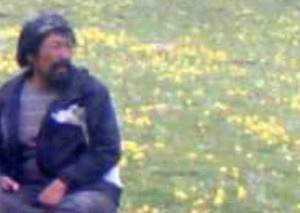
The Tibetan Centre for Human Rights and Democracy (TCHRD) is deeply saddened and appalled by the death in detention of yet another political prisoner in Tibet. Of more immediate concern is the refusal by Chinese prison authorities to release the body of the deceased, and no death certificate has been issued or an autopsy done. Lobsang Yeshi, a former village…
Chinese police have arbitrarily detained a young Tibetan mother for protesting peacefully with a portrait of the Tibetan spiritual leader Dalai Lama in her hand in Tibetan province of Amdo. The woman has been identified as 22-year-old Wangmo from Village no. 3 of Meuruma (Ch: Mai’erma) Township located in Ngaba (Ch: Aba) County in Ngaba Tibetan and Qiang Autonomous Prefecture,…
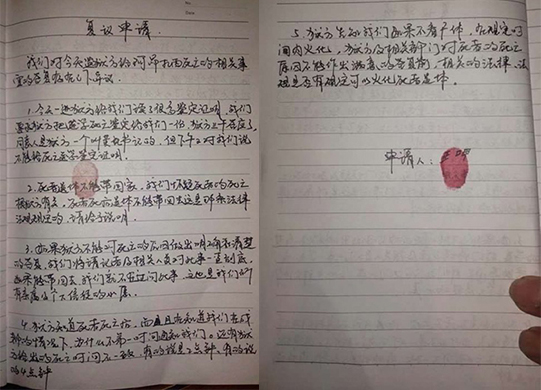
The Tibetan Centre for Human Rights and Democracy (TCHRD) has received the tragic news that Chinese prison officials have cremated Tenzin Delek Rinpoche’s body and still have his remains in their custody.
Tenzin Delek Rinpoche was a prominent reincarnate lama and a highly-revered spiritual leader who died in prison while serving life imprisonment for a crime he never committed. He was in his 13th year of imprisonment when he died on 12 July.
The Tibetan Centre for Human Rights and Democracy (TCHRD) is deeply shocked and saddened by the unexpected death of Tenzin Delek Rinpoche, aged 65 years old, serving a life imprisonment at Chuandong Prison near Chengdu city, capital of Sichuan Province in People’s Republic of China (PRC). The arrest and sentencing of Tenzin Delek Rinpoche and his disciple Lobsang Dhondup demonstrates the Chinese government’s blatant disregard of fundamental human rights for Tibetans and is in violation of both international law and domestic Chinese laws.
There were many problems that took place throughout the legal process for both Rinpoche and Dhondup, from their arbitrary arrests, to their unjust sentencing in Chinese courts and their treatment following their criminal trials. This includes: the arbitrary nature of their arrests; the denial of adequate and fair legal defense for the detainees; the lack of adequate and concrete evidence to support their convictions; the absence of presumption of innocence during their criminal trials; closed and unfair trials; the use of coercive interrogation and torture on the detainees; the denial of visitation rights for the detainees; the denial of the right to be informed for the detainee’s families; arbitrary arrest and sentencing of relatives of the detainees; and, the quick implementation of Dhondup’s execution sentence lessened the chances for Rinpoche to receive a fair retrial.
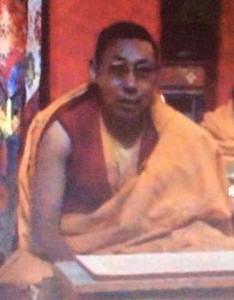
A senior Tibetan monk has been sentenced to twelve years of rigorous imprisonment Diru (Ch: Biru) county, Nagchu (Ch: Naqu) Prefecture, Tibet Autonomous Region (TAR).
Venerable Tenzin Lhundup, an accomplished Buddhist scholar at Gom Gongsar Monastery in Lenchu(Ch: Liangqu) township of Diru County, was sentenced in May 2015, according to reliable information received by Tibetan Centre for Human Rights and Democracy (TCHRD).
Venerable Tenzin Lhundup was sentenced after a year of his arbitrary detention in May 2014. For almost a year, he had been detained in Lhasa and the police did not provide any information to his family and friends about his whereabouts or condition. The news of his sentencing was the only confirmation his family had about his status in over a year, that he had somehow survived the beatings and torture in detention.
TCHRD earlier reported in July 2014 on the arbitrary detention of the Buddhist scholar in May 2014 when he was addressing a public gathering about the on the “status of Tibetan language and nationality” (Tib. mi rigs dang skad yig ki gnas bab skor) to villagers of Shagchu (Ch: Xiaqu) Diru County as requested by the local Tibetans on one of his visits to the area.[i] Immediately, a group of Chinese police arrived at the spot and took him away. He was detained on a Wednesday – the Dalai Lama’s ‘soul day’. A source told TCHRD that on every Wednesday, which is observed in many parts of Tibet as Lhakar or the ‘soul day’ of the Dalai Lama, Tenzin Lhundrup used to give Buddhist teachings to the local Tibetans, help arbitrate disputes, and advocate vegetarianism. He is known also for zealously advocating the need to preserve Tibetan identity. All of these initiatives had earned him much respect and admiration from the local Tibetans.
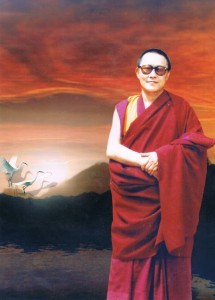
A prominent Tibetan reincarnate lama and philanthropist Tenzin Delek Rinpoche died at the age of 65 while serving life imprisonment at a prison near Chengdu, capital of Sichuan Province, People’s Republic of China.
Tenzin Delek Rinpoche was a highly-respected religious leader in Lithang County, Kardze (Ch: Ganzi) Tibetan Autonomous Prefecture in Sichuan Province, in the Tibetan province of Kham. He was renowned for his active involvement in the restoration of Tibetan culture and religion, social welfare activities and his outspoken criticisms against Chinese policies. On 5 December 2002, Rinpoche and his nephew Lobsang Dhondup were sentenced to death with two years’ reprieve and death sentence respectively for masterminding a series of bomb blast incidents at Tianfu Square in Chengdu. Lobsang Dhondup was executed but Rinpoche’s suspended death sentence was commuted to life due to international pressure.
Tenzin Delek Rinpoche had been held in detention for over thirteen years since his conviction in December 2002 for a crime he never committed.
According to reliable sources inside Tibet, on 2 July 2015 three officials from the Political and Legal Affairs Commission of Lithang County had come to meet Rinpoche’s sisters Donkar Lhamo and Sonam Dekyi asking them to leave with them for Chengdu to discuss the issue of Tenzin Delek.

On 2 July 2015, a 20-year-old Tibetan woman was arbitrarily detained by local Chinese police in connection with the 80th birthday celebration of the Dalai Lama in Meuruma Township in Amdo Province of Tibet.
Tashi Kyi, a Tibetan nomad, was taken to Ngaba (Ch: Aba) County in Ngaba Tibetan and Qiang Autonomous Prefecture, Sichuan Province. There is no information on the exact location of her detention.
Tashi Kyi grew up with her nomad parents, Monu and Tsering Kyi – never attended formal schooling and was raised a nomad. At the time of her detention, she was living with her parents.
Sources in Tibet believe that the detention was related to some activities that took place at the 80th birthday celebration of the Dalai Lama in Meuruma Township. It remains unclear what she did on 21 June, the 80th birthday of the Tibetan spiritual leader, according the Tibetan calendar.
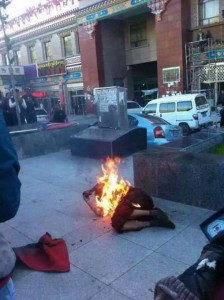
A Tibetan monk self-immolated on 9 July 2015 in the eastern Tibetan province of Kham.
Sonam Topgyal, the 26-year-old monk, staged his self-immolation protest at approximately 6 pm local time in the Gesar Square located in Kyegudo town, in Yulshul (Ch: Yushu) Tibetan Autonomous Prefecture (TAP), Qinghai Province.
“A large contingent of Chinese security forces immediately arrived at the spot of the self-immolation and blocked all the main roads,” a source with contacts in Tibet told the Tibetan Centre for Human Rights and Democracy (TCHRD).
The Beijing-based Tibetan writer Woeser reported on her social media pages that a large number of special paramilitary troops had been sent to Kyegudo soon after self-immolation; they have since blocked the main roads leading to the spot of the self-immolation. All communication services, including telephone lines and Internet, have been shut down in the area.
Recently, Chinese authorities have blocked all Internet lines in Golog (Ch: Guoluo) TAP (Qinghai Province), 11 counties of Kardze TAP (Sichuan Province), and some parts of Ngaba (Ch: Aba) TAP (Sichuan Province). It has been more than half a month since this Internet blockade, making it difficult to get immediate updates on the situation in these areas.
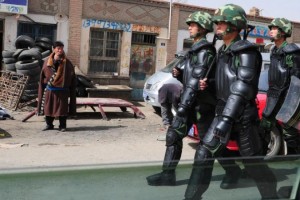
The Tibetan Centre for Human Rights and Democracy (TCHRD) is deeply concerned about the new National Security Law that was released in the People’s Republic of China (PRC) on 1 July 2015. As a human rights organization, TCHRD believes that this new law will enable Chinese authorities to further justify the human rights abuses that continue to take place for Tibetans today.
The new National Security Law does not make any concessions to human rights, rule of law, or the interests of other States or peoples. Instead, the National Security Law relies on broad and vague language to announce that the PRC will confront and fight-back against any perceived threat. This is a continuation of failed policies that do not seek to peacefully settle disputes, and simply exacerbate problems in the PRC instead.
Despite paying lip service to human rights in four articles (Articles 7, 16, 27 and 83), the National Security Law takes the position that is hostile to basic human rights protections. For example, Article 27 says that the PRC protects freedom of religion but then lists duties and responsibilities for religious management, including opposing foreign influence and interference. The PRC views any acknowledgment of the Dalai Lama, including possession of his teachings, praying for his long life or celebrating his birthday, as counter to the Party. For monks, such as Tsangyang Gyatso, the charge of “contacting outsiders” can result in long prison sentences.
